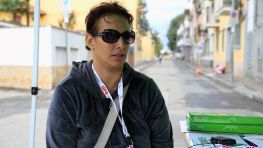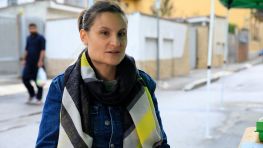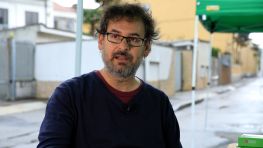 Beatrice Spera
Beatrice Spera Elisa Di Tullio
What is natural is natural for each of us
Elisa is a 38-year-old woman, has two daughters, and works as a doctor for the ASL.
She breastfed both daughters but for a short time, for health reasons, following a genetic kidney disease that she discovered after the birth of Celeste, her eldest daughter. When she was born, Elisa did not force herself to breastfeed her at all costs but began to do so, for about a month, although she was forced to stop afterwards because the baby was admitted to the neonatal intensive care unit for 20 days, Elisa began antibiotic treatment and had to abruptly stop breastfeeding.
She realises that everything rosy that had been portrayed in the pre-natal course was not reflected in her reality. Despite this she also breastfed her second daughter, Costanza, for about three months, and despite all that turmoil, complications did not prevent attachment even if with formula milk.
Elisa, who is well aware of the benefits of breast milk, believes that the mother's psychological wellbeing should also be promoted, just as much as the benefits that milk from the breast brings to the infant's immune system; all those who revolve around mother and child should focus on both components: a mother who is not well psychologically is a mother who cannot breastfeed effectively.
For these reasons, Elisa believes that midwives need to say that childbirth and postpartum can be difficult, or simply get across the idea that it is indeed not that simple. We need to focus more on the individual experience: what is natural is natural for each of us. Those who promote it must be the same person who is ready to intervene in the event of difficulties.
Video table of contents
- Two somewhat unusual pregnancies
- Breastfeeding and intensive care
- Breastfeeding and intimate life
- The feeding bottle
- The pre-natal course
- Adapting to the new mother figure
- Feelings of guilt
- The stereotype of the breastfeeding mother
- The mother's psychological well-being
- Breastfeeding in public
- Breastfeeding other children
- Breastfeeding and job
- The pre-natal course must prepare on the difficulties
- Every individuality is different
Interview information
Country: IT
Region: Piemonte
City: Novara
Martina Riina
Davide Porporato
Luca Ghiardo
Document by: Martina Riina
Video by: Luca Ghiardo, Martina Riina
Created: 23-09-2023
Questo video fa parte del seguente archivio
Breastfeeding: forms and practices of humanity
Breastfeeding: forms and practices of humanity
Breastfeeding is unanimously recognized by the main world health authorities as a fundamental health protection in the short, medium and long term for both the baby and the mother, offering biological, nutritional, emotional, relational and economic benefits.
The most important international scientific societies recommend giving the baby only breast milk for the first six months of life and subsequently accompanying the introduction of other foods with breastfeeding at least for the entire first year of the baby's life, but also up to two years and over if mother and child so wish.
This archive contains some testimonies of mothers and midwives aimed at deepening this theme by offering points of view anchored to individual experiences and sensitivities.






